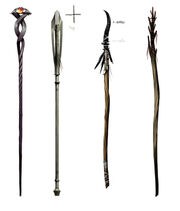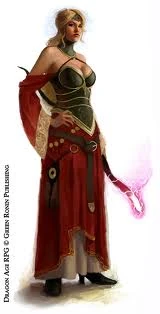ThatRasputin (talk | contribs) (Added link to a page P&P mages) |
ThatRasputin (talk | contribs) No edit summary |
||
| Line 1: | Line 1: | ||
{{For|the class in ''Dragon Age: Origins''|Mage (Origins)}} |
{{For|the class in ''Dragon Age: Origins''|Mage (Origins)}} |
||
{{For|the class in ''Dragon Age II''|Mage (Dragon Age II)}} |
{{For|the class in ''Dragon Age II''|Mage (Dragon Age II)}} |
||
| − | {{For|the class in ''Dragon Age Pen & Paper RPG''|Mage (Pen & Paper RPG)}}<!-- |
+ | {{For|the class in ''Dragon Age: Pen & Paper RPG''|Mage (Pen & Paper RPG)}}<!-- |
Do not remove the transformer until transclusions have been fixed |
Do not remove the transformer until transclusions have been fixed |
||
Revision as of 00:22, 11 March 2013
- For the class in Dragon Age: Origins, see Mage (Origins).
- For the class in Dragon Age II, see Mage (Dragon Age II).
- For the class in Dragon Age: Pen & Paper RPG, see Mage (Pen & Paper RPG).

The mage is a playable class in Dragon Age: Origins and Dragon Age II. A mage is able to interact with the forces of magic. In order to qualify to be a mage, one must be an elf or a human or a Qunari. Dwarves cannot be mages, since they are unable to connect with the Fade and therefore are unable to control the forces of magic.
Origins
Mage spellcasting

The staff, primary weapon of the mage
In Thedas, magic is a natural physical phenomenon such as gravity or magnetism. Some people are born with the ability to interact, control, and shape it. The Tevinter Imperium even had mage genealogies of all families that would produce children with magical talent. Eventually, several social classes of mages were established in Tevinter, from the "Altus" (Magisters), mages who had a long lineage of magic in their bloodlines, to the "Laetan" - mages with no family history of magic use.
Magic originates from the Fade, the realm where Spirits dwell and humans and elves visit when they dream. As such, using it can draw the attention of the beings on the other side of the Veil, leading to an increased risk of demonic possession if they're not vigilant enough. A possessed mage becomes a distortion of their former self, a twisted monster known as an Abomination that has enough power to wipe away entire villages off the map. And that's not including the darker sides of magic, such as Blood Magic, a school taught by demons, which has a long history of corruption, human sacrifice, and greed.
With the proper training however, Mages are capable of manipulating the basic elements, such as conjuring gouts of flame and small localized ice and electrical storms. There are also spells that allow for the temporary reanimation of corpses and the draining of an opponent's life-force. More altruistic Mages can use their powers to help and heal, or summon benevolent spirits in times of need. Though they are ostracized to the point of persecution for it, Mages are key for everyday life in Thedas. They serve as its healers, scholars, scientists, and weapons of war.
The pieces of the puzzle that is magic are scattered around Dragon Age 2, it is revealed that all elves had magic in the days of Arlathan, in Long way home, and that it is possible that it was they who taught blood magic to the Tevinter Magisters, (Merrill having once referred to her blood magic as "the old ways".) but the commonly held belief is that they were actually taught it by Dumat. The Elves today still use a form a magic that's different from the mainstream, based on the primal powers and wild spirits of earth and nature, rather than the spiritual world. It is also worth mentioning that the Elves don't fear or shy from magic nor its users like humans or the Qunari. The Dalish Keepers are widely respected and revered among every clan, as well as by the elves in any Alienage. Every Dalish clan is sworn to protect its Keeper to the death, and should the Keeper fall to demonic possession, they are bound to hunt and slay him/her. However, this happens rarely, as most Keepers are wise and careful enough to never make deals with demons or resort to blood magic.
History
Legend holds that the first known mage was a Tevinter, Archon Thalsian, who was supposedly taught how to use blood magic by the Old God Dumat (over the years, some historians have argued that this is merely a myth, and that Thalsian learned about magic from the elves.) The effect that this discovery had on Thedas is comparable to the effect that the discovery of gunpowder had on Earth; Thalsian taught blood magic to others and soon amassed an army, which he used to conquer Elvenhan, the homeland of the elves. And this was the start of the Tevinter Imperium, which grew to include most of Thedas, and which worshipped the Old Gods.
The Imperium was not satisfied with control of Thedas, however, and in an incredible act of hubris, the magister lords attempted to enter the Golden City and usurp the Maker Himself. Their efforts failed, and to punish them, the Maker transformed them into the first darkspawn. These darkspawn fled underground, and eventually found Dumat and transformed him into the first Archdemon. Thus began the First Blight, which would continue for two centuries and greatly weaken the Tevinter Imperium.
In the wake of the First Blight, the people of the Imperium became disillusioned with the Old Gods, and soon began to follow Andraste, a former slave who united the barbarian tribes and led them to break the Imperium's hold on Thedas. Andraste was ultimately betrayed by her husband, Maferath, and burned at the stake, but her death inspired the creation of the Chantry, an event that would alter the face of magic for centuries afterwards.
The Chantry
As magic had been the source of the Imperium's power, it was all but banned when the Chantry became the new dominant force in Thedas. Blood magic was completely forbidden, and those who practised any kind of magic were confined. At first, the Chantry detained mages and had them continuallly light the eternal flame in every chantry in Thedas, with all other forms of magic forbidden. For such powerful beings to only use their powers in such mundane ways, it surprised almost no one when the mages of the Grand Cathedral protested. Divine Ambrosia was surprised and almost ordered an Exalted March on her own Cathedral, until her own templars advised her otherwise. The Circle of Magi was established to regulate the use of magic throughout Thedas, and the Templars were created to catch mages who refused to join the Circle.
The Chantry preaches that magic is a curse, though it appears impolite to say so in the company of mages.
Modern Thedas

Mage from Dragon Age tabletop RPG by Green Ronin
In the Dragon Age, most mages in Thedas belong to the Circle of Magi. As such, they are taken from their families while still children, and highborn children who are able to use magic will lose all claims to their family's estates and titles when they are taken to the Circle. This helps to create a bond stronger than social class or race, since everybody in the Circle is raised and taught the same way (it also conveniently prevents nobles with mage children from using their power to change magic-regulation policies, the apparent idea being that no noble would ever give up their power to keep their children.)
All mages undergo a process of having their blood taken while apprentices and placed in a phylactery. This ensures the mages' compliance as well as the ability to track down any mage who decides to run away, since a templar can track anyone through their blood. As a further measure, mages who are feared to be incapable of controlling themselves are made Tranquil; their connection to the Fade is magically severed. Though templars insist that the process is painless, one Tranquil who temporarily regained his personality begged to be killed before the Tranquility returned. The Tranquil are notorious for their eerie monotone voices and their tendency to stand in one place for hours on end. During the attack on the Circle in Ferelden, at least one Tranquil was seen calmly wandering the halls even as demons and abominations were running loose.
Some mages manage to escape the notice of the Chantry and the Circle, and grow up without the training that those who are taken from their families will have. Any mage not a part of the Circle is considered to be an apostate, and will be hunted by templars if discovered. Often the older apostates are far more powerful than the Circle Mages; particularly feared are the Witches of the Wilds, to which Flemeth and Morrigan belong, who are capable of changing their shape.
Most humans are taught by the Chantry to fear magic and those who practice it. Mages are looked upon as people to be pitied at best, and hated at worst. The average citizen sincerely believes that the Circle exists only to protect mages and help them learn to control their abilities.
Among non-humans, attitudes towards magic vary. The Dalish are, for all intents and purposes, the most accepting of their mages. Dalish believe that study of magic is key to rediscovering their lost history, and thus are far more tolerant of the presence of magic in their lives. They do, however, acknowledge the inherent danger of magic, and take strides to reduce the risk. Typically a clan will try to keep the number of mages in their group to a minimum by exchanging mage children with other Dalish clans. These children will be personally instructed by the new tribe's Keeper, and if they demonstrate sufficient aptitude will be elevated to be the Keeper's First, an apprentice expected to one day become the clan's new Keeper.
On the opposite end, the Qunari, obsessed as they are with order, have virtually no tolerance or appreciation for mages, which they call saarebas (literally "dangerous thing".) Those among them who are found to possess magical ability are kept on leashes by special soldiers called arvaarad, and fitted with blinders. Their mouths are sewn shut (though apparently, at some point, the stitches are cut) and their horns are sheared off. If a saarebas misuses their powers, their tongue is cut out. Surprisingly, these mages are made to accept their condition without question to their abuse at the hands of any Arvaarad, as they manage to find some measure of solace within the Qun, since they are made to believe there is a purpose to their existence, even if it means the loss of their freedom. They are also taught to pity other mages who are not Qunari, because they will surely doom themselves and everyone who they come in contact with.
Notable mages in Dragon Age
- For a complete list, see [[::Category:Magi]].
- Alain
- Anders
- Baroness
- Flemeth
- Grace
- Hawke (if played as a mage)
- Bethany Hawke
- Idunna
- Irving
- Jowan
- Marethari
- Merrill
- Morrigan
- Orsino
- Rhys
- Tarohne
- Uldred
- Velanna
- The Warden (if played as a mage)
- Wynne
- Zathrian
Trivia
- Referring to mages as "robes" is an insult.[1]
References
- ↑ Gaider, David. Dragon Age: Asunder. New York: Tor. 2011. Print.
| ||||||||||||||||||||

